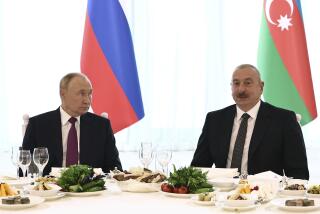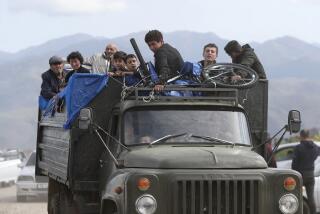NEWS ANALYSIS : Gorbachev Now in Uncharted Waters, Sees No Turning Back : Soviet Union: Leader has transformed challenges into breakthroughs. But the civil war in the south is one crisis he appeared to be unprepared for.
- Share via
MOSCOW — Crises are not new to President Mikhail S. Gorbachev, and he moves from one to the next with a determination that nothing will halt his plans to reform the Soviet Union.
In the past year, the Soviet leader has dealt with the dramatic upheaval in Eastern Europe, with an unprecedented wave of potentially paralyzing strikes at home, with ethnic riots and nationalist protests in most of the country’s constituent republics, with resistance from conservatives to his reforms and with rising social discontent that brought increased crime and threatened bread riots.
Most of these crises he turned to his own advantage, transforming challenges into opportunities for bold political and economic breakthroughs, often taking apparent vulnerabilities and creating new strength from them.
But the virtual civil war that erupted this week in the south, between Armenia and Azerbaijan, is one crisis for which Gorbachev appears to have been unprepared, one that will not be dealt with quickly or easily--and one that seems to hold very little prospect for such a magical transformation.
Not only is the enmity between the Armenians and the Azerbaijanis centuries old and deep-seated, but it is now burning with an increasing intensity.
There are fears in political circles here that the burden on Gorbachev has become too large, that with each new crisis he approaches the limits of the room in which he has to maneuver and that his “new political thinking” is more difficult to apply to domestic problems than it was to international issues.
Nation Has No Choice
Gorbachev, defending his reforms Thursday at a Kremlin conference of workers, farmers and technical personnel, insisted that the nation has no choice but to proceed, even more boldly than before, with perestroika, his reform program.
“We simply cannot continue to live as we have done,” he said, responding to widespread conservative sentiment that the country’s problems would be eased if it returned to the old methods. “Yes, we need perestroika as we need air. We need it to reveal the potential of our system. . . . (Results) are in progress. This too must be seen so as not to get into a flap, saying everything is going to pieces. What is falling apart are the old ways.”
The crisis in Armenia and Azerbaijan is too far from the central questions facing Gorbachev--how to restructure the Soviet economy so that the country emerges from its prolonged stagnation, how to share political power and avoid drifting without direction, how to recover the nation’s moral strength--to determine the success or failure of perestroika or his tenure as the Soviet leader.
But that conflict, and its growth, reflects many of the problems facing Gorbachev.
The crisis had been building for many months. Nearly two years ago, 32 people were killed in anti-Armenian riots in the Azerbaijani city of Sumgait, and tension had remained high, particularly around the disputed region of Nagorno-Karabakh, an enclave of Christian Armenians in predominantly Muslim Azerbaijan.
Gorbachev, true to his belief that political solutions can be found even for the toughest problems, had doggedly pursued a compromise that not only would satisfy the Armenians and Azerbaijanis but, according to senior Communist Party officials, also would contribute to his search for a new federal structure that will balance the differing interests of the Soviet Union’s many ethnic groups.
To Gorbachev, according to party officials who know his thinking, the process of negotiation is nearly as important as the result, for he sees it playing an essential role in creating the new political system he wants for the country and in making that system work in the future.
But those long talks led nowhere, and a top party official involved in them told the newspaper Literary Gazette, “The time for productive interference has been lost, and the situation is beyond control now.”
The present crisis became all but inevitable at the end of November when the central government, frustrated by the lack of agreement, reaffirmed Nagorno-Karabakh as part of Azerbaijan and decided to end its administration of the region. Armenia reacted by moving to annex the territory, and Azerbaijan responded with its own countermeasures.
The anti-Armenian attacks last weekend, in which scores of people died, resulted directly from the frustrations of the tens of thousands of Azerbaijanis who had fled their homes in Armenia over the last two years but who were still living as refugees, without proper housing or jobs, in Baku.
“We should have been prepared for the Armenian and Azerbaijani reactions, and we weren’t,” a political commentator remarked. “Whatever hope there might have been was lost at that point. Tensions, which had remained high, built up and exploded, simply exploded. And now we have a Beirut.”
Questions are now being asked why the government moved so slowly, why only now it is deploying troops to restore order. Speakers who took the floor after Gorbachev at the Kremlin declared again and again that, as one worker put it, “our country must be led.”
Thousands of letters to the editors are arriving daily at the country’s major newspapers with comments on the situation in Armenia and Azerbaijan, and the prevailing sentiment is for much firmer action.
“You read these letters and you realize how conservative a nation we are, how we yearn for stern rulers, and how little changed we are,” an editor at a weekly journal remarked. “These people do not say they want a return to the old days, but they do expect the law to be upheld and transgressors to be punished. . . . The political resolution of disputes is good, they feel, but if it fails, they ask, ‘Where is the Red Army?’ ”
Even a commentator writing for the government newspaper Izvestia noted this week, in supporting the decision to use troops to restore order in Azerbaijan: “No one can rebuke the leadership for showing a lack of restraint. To the contrary, it was satisfied for too long with using only political means.”
The leadership did move slowly in sending more peacekeeping troops to the region, and deliberately so, several well-informed sources said after a briefing at party headquarters this week.
“It’s the Tbilisi syndrome,” a political commentator said, referring to the decision last April to use troops to break up a demonstration in the Georgian capital of Tbilisi. At least 20 people were killed there, mostly women and the elderly, when the soldiers beat them with shovels and clubs and used gas to clear the square outside the government offices.
“If you use the army,” the commentator went on, “you risk serious violence with unpredictable results. This leadership will think very long and very hard about using the army unless the situation is truly out of hand.”
Conservative Threat
Gorbachev may also have hesitated to send troops into the region for fear of giving comfort to his conservative critics, with whom he is now battling over the new party platform and his desire to accelerate and broaden the country’s political and economic reforms.
A further factor, cited by Western diplomats here, might have been a fear of alienating the country’s numerous and increasingly militant Muslims. Totaling more than 50 million, they are the majority in six of the Soviet Union’s 15 constituent republics. Iran, which borders Azerbaijan and shares religious and cultural links with it, warned Moscow this week against suppressing the Muslims there.
But a major factor in determining Gorbachev’s response to the conflict appears to have been his preoccupation with half a dozen other pressing issues.
As the crisis broke with a wave of anti-Armenian violence last weekend that left more than 40 people dead in Baku, the Azerbaijani capital, Gorbachev had just returned from his trip to Lithuania, where he attempted to persuade the leaders of that Baltic republic to remain within a liberalized Soviet federation.
He had other problems, too--the new Communist Party platform to be adopted later this month and already the focus of sharp contention; the emergency program for an economy that seems only to get worse; slowness in enacting the legislation needed to underpin his whole reform program.
“Armenia and Azerbaijan had long become a chronic problem, and it was always on our horizon, but not in the middle, not up front,” a senior party official said this week. “We will restore order there, and we will get through this crisis. We will look for an equitable settlement there--but we might not find one soon.
“But we will not allow ourselves to distracted from our overall goals, and we will not be deterred from pursuing perestroika and democratization. On that, Mikhail Gorbachev is very firm.”
More to Read
Sign up for Essential California
The most important California stories and recommendations in your inbox every morning.
You may occasionally receive promotional content from the Los Angeles Times.













